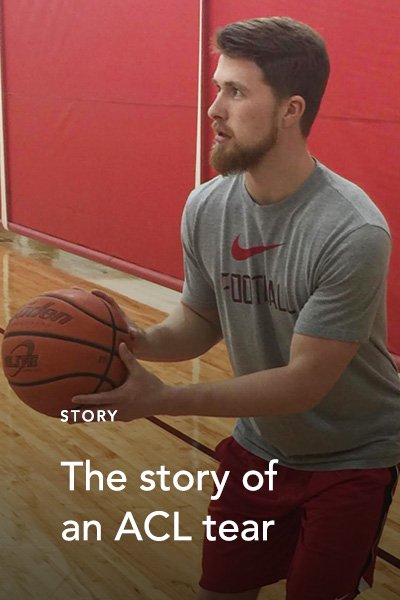Posterior Cruciate Ligament (PCL) Tear/Reconstruction
PCL Tear Surgery with Dr. Van Thiel
Read more below about this treatment option below.
The posterior cruciate ligament (PCL) is one of several major ligaments that form the knee joint (along with the anterior cruciate ligament, the lateral collateral ligament and the medial collateral ligament). Ligaments are strong bands of fibrous tissue that attach one bone to another. In the knee joint, the lower end of the thigh bone (femur) meets the upper end of the shin bone (tibia), and the four main ligaments hold the knee in position and enable it to move normally.
The strongest ligament in the knee joint, the PCL is attached to the back of the femur and the front of the tibia, and it prevents the tibia from moving too far backward, helping to stabilize the knee and working with the anterior cruciate ligament (ACL) to enable the knee to bend back and forth. While most of us have heard of injuries to the ACL, PCL injuries also occur, and when they do, those injuries often are accompanied by other knee injuries, including injury to the ACL.
What are the primary causes of a PCL tear?
Because the PCL is very strong, it takes a lot of force to cause a tear or sprain. Most injuries are caused by a strong, direct impact to the knee, especially when it’s bent – for instance, falling hard on your bent knee when participating in sports, or hitting your bent knee against the car dashboard during a car accident. Hyperextension injuries and sharp twisting injuries, including injuries from missteps, can also cause PCL sprains and tears.
What kinds of symptoms are associated with a PCL tear?
Most people with PCL tears will have pain accompanied by swelling that occur very soon after the injury. As the joint swells, movement will become more difficult, and the knee will feel unstable when weight is placed on it. You may have problems or pain when going down stairs or moving down inclines or during activities that require you to twist or pivot your knee and lower leg. Like ACL tears, PCL tears are graded, with Grade 1 injuries including mild sprains with very limited symptoms, Grade 2 injuries that cause partial tears of the PCL, and Grade 3 injuries caused by complete tears of the PCL.
What is PCL reconstruction?
While many PCL injuries are relatively mild and may heal with rest and physical therapy, Grade 2 and Grade 3 injuries typically require surgery to reconstruct the ligament so the patient can return to their normal activities. While some torn tissues can be repaired by stitching together the ends of the tissues, that’s not the case with ligaments, which are subjected to significant stresses and strains when joints are bent and used. In these instances, grafts must be used to repair and rebuild the ligament in a procedure called posterior cruciate ligament reconstruction.
In PCL reconstruction, the damaged ligament is replaced by a graft taken from elsewhere in your body (an autologous graft) or a graft from a donor (an allograft). Over time, the graft tissue fuses with your bone tissue to form a secure attachment between the thigh bone and the shin bone. Luckily, with new techniques, the PCL can be reconstructed with an arthroscopic procedure. In knee arthroscopy small incisions are used to access the knee joint and reconstruct the PCL without large incisions that slow recovery. As your knee heals, physical therapy will help your knee regain strength, stability and function. In most cases, complete recovery will take from six months to a year. During that time, your therapist will work with you to help you gradually resume your regular activities, including a return to sports.
Do you need PCL surgery?
A board-certified orthopedic surgeon and sports medicine specialist, Dr. Geoffrey Van Thiel is a leading provider of knee injury evaluation and PCL surgery for patients in the greater Chicago region. As a patient, your treatment will begin with a careful assessment to identify the specific cause of symptoms so you can feel confident you’ll receive the most appropriate care for your needs, using state-of-the-art approaches for optimal results. If you’re having knee pain, delaying treatment can result in long-term disability.
Call OrthoIllinois at 815-398-9491 and schedule a consultation with Dr. Van Thiel today.





